七年级英语上册 Unit 5 Do you have a soccer ball Period 3(Section B 1a-1d)教案 (新版)人教新目标版
人教版七年级上册Unit 5 Do you have a soccer ball.重点句子背诵

人教版英语七年级上册第五单元Unit5Doyouhaveasoccerba11?重点句子背诵同学们,英语的学习中,重点句子的积累至关重要,一方面,它们是语法知识的体现,另一方面,它们又是书面表达的基础,1>Doyouhavesoccerba11?你有一个英式足球吗?这是由助动词do帮助动词have引导的一般疑问句。
回答:Yes,Ido.∖No,Idon't.2、Doesshehaveatennisba11?他有一个网球吗?这是由助动词does帮助动词have引导的一般疑问句。
回答:Yes,shedoes.∖No,shedoesn't.3、Doeshehaveabasketba11?他有一个篮球吗?这是由助动词does帮助动词have引导的一般疑问句。
回答:Yes,hedoes.∖No,hedoesn't.4、Dotheyhaveabasketba11?他们有一个篮球吗?这是有助动词do帮助动词have引导的一般疑问句。
回答:Yes,theydo.∖No,theydon't.5、Ihaveavo11eyba11,我有一个排球。
6、Shehasabaseba11,他有一个棒球。
7、Hehastwoping-pongba11s.他有两个乒乓球。
8、TheyhaVeaVO1IeybaI1.他们有一个排球。
从第5句到第8句,仔细观察不难发现:当主语是1∖they的时候,动词用原形have表示“拥有”;当主语是he∖she的时候,动词用has第三人称单数形式表示“拥有”。
注意谓语动词和主语是一一对应的关系。
也就是说,当主语是第三称单数时,谓语动词就用第三人称单数形式;当主语不是第三人称单数时,动词用原形。
又如:Wehavesomegoodfriends.我们有一些好朋友。
Ithasagoodname.它拥有一个好的名字。
9>Iefsgo.走吧!∖1etmegetit.让我去取吧。
人教版英语七上 U5 Do you have a soccer ball 讲义

Unit5 Do you have a soccer ball?一、重点词汇及拓展1. have v.(1) 有e.g. I have a pen. 我有一只钢笔。
(2) 吃;喝e.g. I have breakfast every day. 我每天吃早饭。
(3) 经历e.g. have a good time 玩得开心;过得愉快(4) 上课e.g. We have English lessons every day. 我们每天上英语课。
(5) 举办e.g. Mark has a party. 马克举办了一个派对。
(6) 得…病e.g. He has a cold and a headache. 他感冒和头疼。
2. let v.允许;让let’s = let us 让我们let sb. do sth. 让某人做某事let sb. not do sth. 让某人不要做某事e.g. Let’s have a party tonight! 让我们今晚举办一个派对吧!make sb. do sth. 使某人做某事e.g. The movie makes me miss my mother. 这部电影使我怀念我的妈妈。
3. go v.去;走go to +地点去某地go to school 去学校go here/there/home 去这儿/去那/回家go shopping 去购物go swimming 去游泳go hiking 去远足go skating 去轮滑go boating 去划船4. lateadj. 迟的;晚的be late for school 上学迟到be late for class 上课迟到1be late for work 上班迟到adv. 迟地;晚地later adv. 后来;以后e.g. Three days later, he found his father. (句中有段时间+later,句子用一般过去时)三天后,他找到了他的爸爸。
七年级英语上册 Unit 5 Do you have a soccer ball(单词+重点句型)语法解析
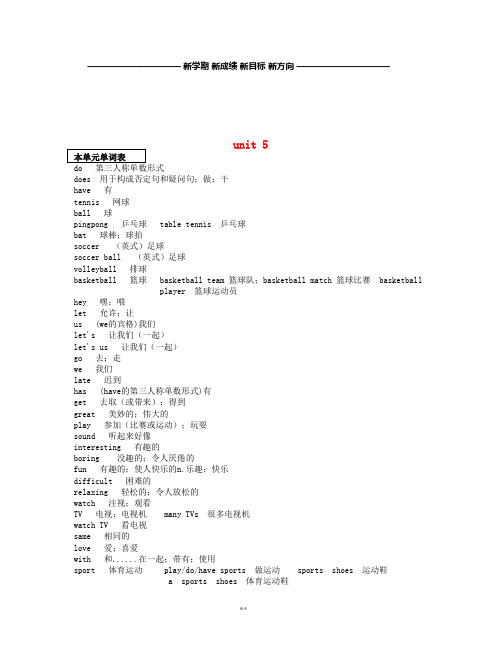
——————————新学期新成绩新目标新方向——————————unit 5does 用于构成否定句和疑问句;做;干have 有tennis 网球ball 球pingpong 乒乓球 table tennis 乒乓球bat 球棒;球拍soccer (英式)足球soccer ball (英式)足球volleyball 排球basketball 篮球 basketball team 篮球队;basketball match 篮球比赛 basketball player 篮球运动员hey 嘿;喂let 允许;让us (we的宾格)我们let's 让我们(一起)let's us 让我们(一起)go 去;走we 我们late 迟到has (have的第三人称单数形式)有get 去取(或带来);得到great 美妙的;伟大的play 参加(比赛或运动);玩耍sound 听起来好像interesting 有趣的boring 没趣的;令人厌倦的fun 有趣的;使人快乐的n.乐趣;快乐difficult 困难的relaxing 轻松的;令人放松的watch 注视;观看TV 电视;电视机 many TVs 很多电视机watch TV 看电视same 相同的love 爱;喜爱with 和......在一起;带有;使用sport 体育运动 play/do/have sports 做运动 sports shoes 运动鞋a sports shoes 体育运动鞋them (they的宾格)他(她、它)们only 只;仅like 喜欢;喜爱easy 容易的;不费力的after 在......以后class 班级;课(近义词:lessen);等级;类别;阶段classmate 同班同学 roommate 室友 workmate 同事 deskmate 同桌schoolmate 校友Bill 比尔(男名)on的用法,详见unit4【解析】on可以表示“通过;使用……方式”,后面通常接表示通信工具的名词。
Unit 5 Do you have a soccer ball 知识点归纳-七年级上册英语

人教版新目标七上英语单元知识点归纳Unit 5 Do you have a soccer ball?重点词汇tennis/'tenis/ n. 网球bat /bæt/ n. 球棒;球拍soccer ball (英式)足球volleyball/'vɔlibɔ:l/ n. 排球basketball/'ba:skitbɔ:l/ n. 篮球late/leit/ adj. 迟到great/greit/ adj. 美妙的;伟大的play/plei/ v. 参加(比赛或运动);玩耍sound/saund/ v. 听起来好像interesting/'intrəstiŋ/ adj. 有趣的boring/'bɔ:riŋ/ adj. 没趣的;令人厌倦的fun/fʌn/ adj. 有趣的;使人快乐的n.乐趣;快乐difficult/'difikəlt/ adj. 困难的relaxing/ri'læksiŋ/ adj. 轻松的;令人放松的watch/wɔtʃ/ v. 注视;观看same/seim/ adj. 相同的easy/'i:zi/ adj. 容易的;不费力的class/kla:s/ n. 班级;课classmate/'kla:smeit/ n. 同班同学重点短语:a tennis bat 一个网球拍play basketball 打篮球baseball bat 棒球棒have a soccer ball 有一个足球play soccer 踢足球with our friends 和我们的朋友一起have a ping-pong ball 有一个乒乓球play ping-pong 打乒乓球have a volleyball 有一个排球play volleyball 打排球at school 在校,上学play sports 做运动watch TV 看电视in my bag 在我的包里be late 迟到on TV 电视上必背典句:1. Do you have a soccer ball? 你有一个足球吗?2. Does he/she have a ping-pong ball?他/她有一个乒乓球吗?3. Do you play sports with your classmates? 你和你的同学一起做运动吗?4. Let’s play soccer together! 我们一起踢足球吧!5. How many sports do you like?你喜欢多少种运动?6. I like playing soccer and basketball. 我喜欢踢足球和打篮球。
英语人教版七年级上册Unit5 Do you have a soccer bal
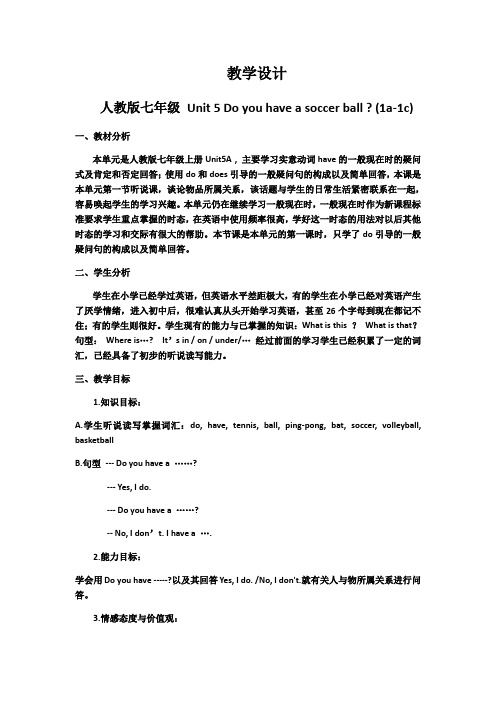
教学设计人教版七年级Unit 5 Do you have a soccer ball ? (1a-1c) 一、教材分析本单元是人教版七年级上册Unit5A , 主要学习实意动词have的一般现在时的疑问式及肯定和否定回答;使用do和does引导的一般疑问句的构成以及简单回答,本课是本单元第一节听说课,谈论物品所属关系,该话题与学生的日常生活紧密联系在一起,容易唤起学生的学习兴趣。
本单元仍在继续学习一般现在时,一般现在时作为新课程标准要求学生重点掌握的时态,在英语中使用频率很高,学好这一时态的用法对以后其他时态的学习和交际有很大的帮助。
本节课是本单元的第一课时,只学了do引导的一般疑问句的构成以及简单回答。
二、学生分析学生在小学已经学过英语,但英语水平差距极大,有的学生在小学已经对英语产生了厌学情绪,进入初中后,很难认真从头开始学习英语,甚至26个字母到现在都记不住;有的学生则很好。
学生现有的能力与已掌握的知识:What is this ?What is that?句型:Where is…? It’s in / on / under/…经过前面的学习学生已经积累了一定的词汇,已经具备了初步的听说读写能力。
三、教学目标1.知识目标:A.学生听说读写掌握词汇:do, have, tennis, ball, ping-pong, bat, soccer, volleyball, basketballB.句型--- Do you have a ……?--- Yes, I do.--- Do you have a ……?-- No, I don’t. I have a ….2.能力目标:学会用Do you have -----?以及其回答Yes, I do. /No, I don't.就有关人与物所属关系进行问答。
3.情感态度与价值观:A热爱体育活动,培养适合自己的体育爱好,锻炼身体。
B.在小组活动中,培养学生团结协作精神。
人教版七年级上Unit5 Do you have a soccer ball知识点归纳
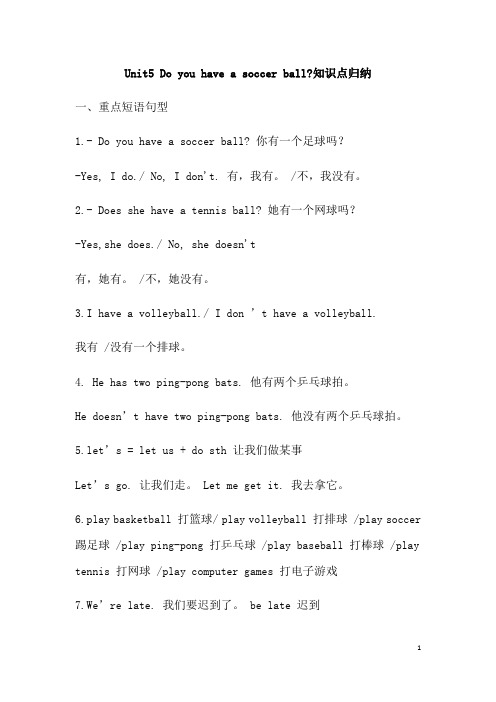
Unit5 Do you have a soccer ball?知识点归纳一、重点短语句型1.- Do you have a soccer ball? 你有一个足球吗?-Yes, I do./ No, I don't. 有,我有。
/不,我没有。
2.- Does she have a tennis ball? 她有一个网球吗?-Yes,she does./ No, she doesn't有,她有。
/不,她没有。
3.I have a volleyball./ I don ’t have a volleyball.我有 /没有一个排球。
4. He has two ping-pong bats. 他有两个乒乓球拍。
He doesn’t have two ping-pong bats. 他没有两个乒乓球拍。
5.let’s = let us + do sth 让我们做某事Let’s go. 让我们走。
Let me get it. 我去拿它。
6.play basketball 打篮球/ play volleyball 打排球 /play soccer 踢足球 /play ping-pong 打乒乓球 /play baseball 打棒球 /play tennis 打网球 /play computer games 打电子游戏7.We’re late. 我们要迟到了。
be late 迟到8.That sounds good. 那听起来很不错。
That sounds interesting/fun/relaxing/boring/difficult. 那听起来很有趣 /放松 /无聊 /困难。
9.watch TV 看电视10.play sports with our classmates 和我的同学做运动11.go to the same school 去同一间学校上学。
12.at school 在学校13.only watch them on TV 只在电视上看它们14.It ’s adj(形容词) for sb.对某人来时怎么样。
人教版英语七年级上册Unit-5--do-you-have-a-soccer-ball

人教版英语七年级上册Unit 5 Do you have a soccer ball?单元教材分析本单元主要学习动词have的一般现在时的用法;使用do和does引导的一般疑问句的构成以及简单回答。
本单元围绕“和朋友一起欢度时光”这一话题安排了三个任务:一是列举所学的运动项目,从中挑选出各自喜欢的体育项目,并说明原因,目的是巩固并新学一些体育项目的名词;二是让学生互相询问所爱好的运动,并根据情况发出邀请,学会用have对物品的所属进行提问与回答,掌握用do和does引导的一般疑问句的构成及使用,了解用Let’s 提建议的句型;三是写作,把任务一、二的完成情况写成日记,进一步复习、巩固所学的语言目标。
通过本单元的学习,学会用have对物品的所属进行提问与回答;学会用let’s…句型提建议;能够谈论自己喜欢哪些球类运动,不喜欢哪些球类运动及原因;能够谈论怎样和自己的朋友度过一段愉快的时光。
单元总体目标.1. 在询问对方是否有某物的对话中学会使用do和does引导的一般疑问句。
2. 学会使用描述性的形容词来评价事物。
3. 学会在对话中使用名词复数。
4. 学会用祈使句来向对方提出建议。
5. 学会用祈使句询问某人是否有某物。
6. 学会向他人提出建议的句子。
7. 学习了解一般现在时。
8. 在本单元中,通过阅读有关运动的文章和对话,使学生更加热爱体育活动并培养一种适合自己的体育爱好。
9.在小组活动中,培养学生团结协作精神。
单元重难点一览表本单元的主题是使用have对物品的所属进行提问及回答,以掌握行为动词在一般现在时中的构成和使用;同时引导学生使用所学的句型谈论自己在球类运动中的喜好。
行为动词在一般现在时的肯定句、否定句和一般疑问句中的构成和使用是初中英语教学中非常重要的内容,本单元知识的掌握程度将直接影响今后的英语学习。
学生在以前的学习中已经掌握了be动词在一般现在时中的构成和使用,在学生的头脑中也已经形成了一个模式,这种模式将直接影响学生对本单元知识内容的接受,所以教师在教学中一定要善于引导,以免学生养成不良习惯。
七年级英语上册Unit5 Do you have a soccer ball知识点全面讲解与练习
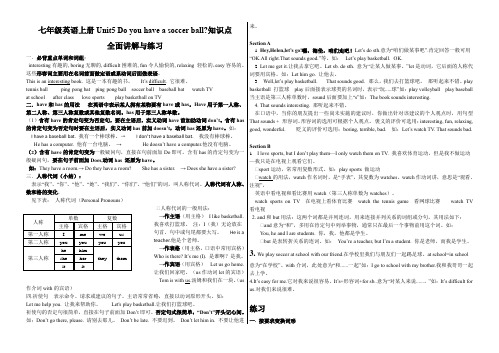
七年级英语上册Unit5 Do you have a soccer ball?知识点全面讲解与练习一.必背重点单词和词组:interesting有趣的, boring无聊的, difficult困难的, fun令人愉快的, relaxing轻松的,easy容易的。
这些形容词主要用在名词前面做定语或系动词后面做表语。
This is an interesting book. 这是一本有趣的书。
It’s difficult. 它很难。
tennis ball ping-pong bat ping-pong ball soccer ball baseball bat watch TVat school after class love sports play basketball on TV二.have和has的用法在英语中表示某人拥有某物要有have或has。
Have用于第一人称、第二人称、第三人称复数或其他复数名词。
has用于第三人称单数。
(1)含有have的肯定句变为否定句,要在主语后,实义动词have前加助动词don’t。
含有has 的肯定句变为否定句时要在主语后,实义动词has前加doesn’t,动词has还原为have。
如:I have a baseball bat. 我有一个棒球棒。
→I don’t have a baseball bat.我没有棒球棒。
He has a computer. 他有一台电脑。
→ He doesn’t have a computer.他没有电脑。
(2)含有have的肯定句变为一般疑问句,直接在句前面加Do即可。
含有has的肯定句变为一般疑问句,要在句子前面加Does,动词has 还原为have。
如:They have a room.→ Do they have a room? She has a sister. → Does she have a sister?三.人称代词(小结):表示“我”、“你”、“他”、“她”、“我们”、“你们”、“他们”的词,叫人称代词。
七年级英语上册《Unit 5 Do you have a soccer ball》知识点 (新版)人教版

Unit 5 Do you have a soccer ball?1. Do you have......? Yes, I do. No, I don’t..你有……吗?是的,我有。
不,我没有。
Do they have......? Yes, they do. No, they don’t..Does he have......? Yes, he does. No, he doesn’t.Does she have......? Yes, she does. No, she doesn’t.在一般现在时中,句子的谓语动词若是实义动词,常借助助动词do或does来构成否定句或疑问句。
Does用于主语是第三人称单数的句子中,其他情况用do。
2. do/does1)作助动词,帮助构成一般现在时的否定句或疑问句,无意义。
Do you have a soccer ball? 你有足球吗?I don’t know. 我不知道。
Does Jim have a sister? 吉姆有妹妹吗?What does he like? 他喜欢什么?He doesn’t like English. 他不喜欢英语。
2) 作实义动词,“做,干”。
I do my homework every day. 我每天都做家庭作业。
Bob does his homework every day. 鲍勃每天都做家庭作业。
3) 在一般现在时中,do/does 可用来替代上文出现过的动词,以避免重复。
Do you have a soccer ball? 你有足球吗?Yes, I do. 是的,我有。
(do 代have)Does she have an eraser? Yes, she does.I don’t have a soccer ball, but my brother Alan d oes.我没有足球,但我的哥哥艾伦有。
3.Let’s do sth. “(让)我们做某事吧。
人教版七年级上册英语讲义 Unit 5 Do you have a soccer ball

Unit5 Do you have a soccer ball?讲义一、【重点单词】do /du:/助动词,帮助构成一般现在时的否定句或疑问句,无意义;实义动词“做,干”have /hæv/有tennis /'tenɪs/网球ball /bɔ:l/球ping-pong乒乓球bat /bæt/球棒;球拍soccer /'sɑ:kər/,/'sɒkə/(英式)足球soccer ball(英式)足球volleyball /'vɒlɪbɔ:l/排球basketball /'bɑ:skɪtbɔ:l/篮球let /let/允许;让us /ʌs/ (we的宾格)我们let's = let us让我们(一起)go /ɡəʊ/去;走we /wi:/我们late /leɪt/迟到has /hæz/有(have的第三人称单数形式)get /ɡet/去取(或带来);得到great /ɡreɪt/美妙的;伟大的play /pleɪ/参加(比赛或运动);玩耍sound /saʊnd/听起来好像interesting /'ɪntrəstɪŋ/有趣的;使人快乐的;乐趣;快乐difficult /'dɪfɪkəlt/困难的relaxing /rɪ'læksɪŋ/轻松的;令人放松的watch /wɒʧ/注视;观看TV /,ti:'vi:/电视same /seɪm/相同的love /lʌv/爱;喜爱with /wɪð/和...在一起;带有;使用sport /spɔ:(r)t/体育运动them /ðem/ /ðəm/他(她、它)们only /'əʊnlɪ/只;仅like /laɪk/喜欢;喜爱easy /'i:zi/容易的;不费力的after /'ɑ:ftə/在...之后class /klɑ:s/班级;课classmate /'klɑ:smeɪt/同班同学二、【重点短语】1. have a volleyball 有一个排球2. play volleyball/tennis 打排球/网球3. have a ping-pong/table tennis 有一个乒乓球4. play ping-pong/table tennis 打乒乓球5. with our friends 和我们的朋友一起6. have a football/soccer ball 有一个足球7. play football/soccer 踢足球8. at school 在校,在上学9. play sports 做运动10. play computer games 玩电脑游戏11. watch TV 看电视12. in the same school 在同一所学校13. after class 下课后14. go to school 去上学三、【重点句型】1. —Do you have a ping-pong bat? 你有一个乒乓球拍吗?—No, I don’t. 不,我没有。
人教版英语七年级上册Unit_5_Do_you_have_a__soccer_ball教材全解及单元

人教版英语七年级上册Unit 5 Do you have a soccer ball?教材全解及单元测试卷【教材内容解析】Section A1.soccer ball (P. 25)soccer ball表示“(英式)足球”。
I have a soccer ball.2.Do you have a ping pong bat? (P. 25)have用作及物动词,表示“有、拥有”,强调某人拥有某物。
I have a sister.He has a watch.3.Hey, Helen, let’s go! (P. 26)let’s do sth.意为“咱们做某事吧”,用于提出建议或者请求对方同自己一起做某事,肯定回答用OK, All right, That sounds great, Good idea等,否定回答用Sorry, I...。
---Let’s play basketball.---OK.【拓展】let’s包括说话者和听话双方;let us只包括说话者一方。
Let’s do our homework.Please, sir, let us go now.4.We’re late! (P. 26)late用作形容词,表示“迟到、晚的”,be late for表示“……迟到”。
I am never late for school.【拓展】late还可以用作副词,表示“迟地、晚地”。
Today he gets up late.5. Let me get it. (P. 26)get用作及物动词,意为“取、得到”。
We must open the door and get the ball.Can you get a banana for me?6.Well, let’s play basketball. (P. 27)play此处用作及物动词,意为“参加踢/打(球)”,后接球类名词时,前不用冠词。
七年级英语上册unit5doyouhaveasoccerba
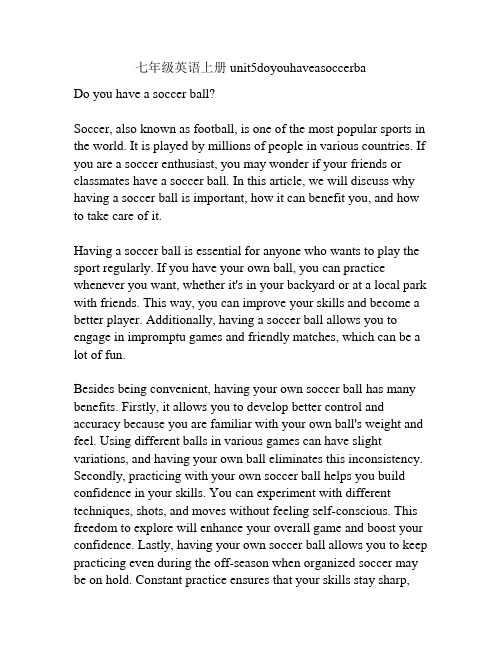
七年级英语上册unit5doyouhaveasoccerbaDo you have a soccer ball?Soccer, also known as football, is one of the most popular sports in the world. It is played by millions of people in various countries. If you are a soccer enthusiast, you may wonder if your friends or classmates have a soccer ball. In this article, we will discuss why having a soccer ball is important, how it can benefit you, and how to take care of it.Having a soccer ball is essential for anyone who wants to play the sport regularly. If you have your own ball, you can practice whenever you want, whether it's in your backyard or at a local park with friends. This way, you can improve your skills and become a better player. Additionally, having a soccer ball allows you to engage in impromptu games and friendly matches, which can be a lot of fun.Besides being convenient, having your own soccer ball has many benefits. Firstly, it allows you to develop better control and accuracy because you are familiar with your own ball's weight and feel. Using different balls in various games can have slight variations, and having your own ball eliminates this inconsistency. Secondly, practicing with your own soccer ball helps you build confidence in your skills. You can experiment with different techniques, shots, and moves without feeling self-conscious. This freedom to explore will enhance your overall game and boost your confidence. Lastly, having your own soccer ball allows you to keep practicing even during the off-season when organized soccer may be on hold. Constant practice ensures that your skills stay sharp,ensuring you are ready to showcase your abilities during the next season.To take care of your soccer ball and make it last longer, it is important to follow a few guidelines. Firstly, always keep your ball clean. Wipe off any dirt, grass, or mud after each use. If your ball gets wet, make sure to dry it before storing it. Secondly, be careful when using your ball on abrasive surfaces, such as concrete or asphalt, as this can damage the outer surface. If possible, play on grass or softer surfaces to extend the life of your ball. Thirdly, avoid overinflating or underinflating your ball. Follow the manufacturer's guidelines for the recommended pressure. Lastly, store your ball in a cool, dry place, away from direct sunlight or extreme temperatures. Proper storage will prevent damage to the ball's material, preserving its quality for a longer time.In conclusion, having your own soccer ball is beneficial for regular practice and enjoyment of the sport. It allows you to practice whenever and wherever you want, improving your skills and boosting your confidence. Taking care of your ball ensures its longevity, allowing you to use it for a long time. So, if you are passionate about soccer, consider investing in your own soccer ball. Start practicing and enjoy the beautiful game!。
人教版七年级上册英语Unit5 Do you have a soccer ball单元语法聚焦

Do
have
• 2.He has a computer.(改为一般疑问句)
• Does he have a computer? • 3.She has a tape player.(改为否定句)
• She doesn’thave a tape player.
• 4.Doe she plays ports everyday? (作肯定回答)
• —No,they
d. on’t
• Ⅱ.单项选择。
( D ) 1.—Who plays soccer well?
—Eric
.
A.is B.do C.plays D.does
( C ) 2. —Does Alice have a tennis bat?
—
.
A.Yes, she is
B.No, she isn’t
• —No,thDeyoes .
• 3.—
he hadvoeesa tennis ball?
• —Yes, he .
• 4.—
DAnoneas have a ping-pong bat?
• —No, she doe. sn’t
• 5.—
MDioke and Eric have any balls?
• Do you have a bike? 你有自行车吗?
• Does Tom have a bike? 汤姆有自行车吗?
• 二、语法专练
• Ⅰ.用do,does,don’t,doesn’t填空。
• 1.— Dyoou have a TV?
do
• —Yes, I .
Do
• 2.—
they hdaoven’a ctomputer?
七年级英语上册 Unit 5 Do you have a soccer ball讲义 (新版)人教新
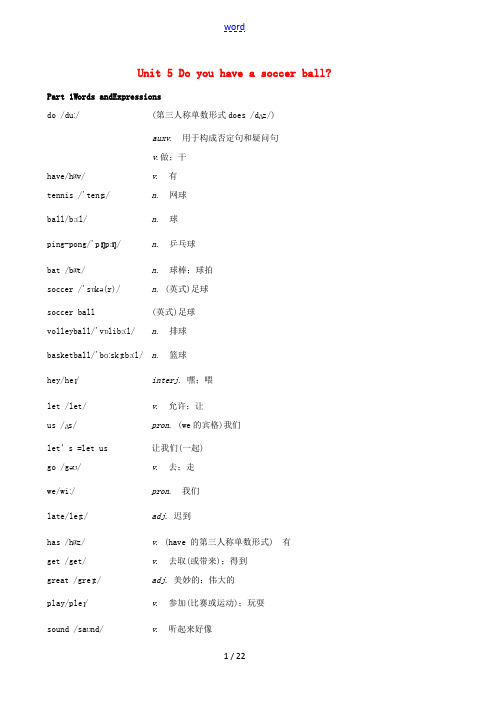
Unit 5 Do you have a soccer ball? Part 1Words andExpressionsdo /duː/ (第三人称单数形式does /dʌz/)auxv. 用于构成否定句和疑问句v.做;干have/hæv/ v. 有tennis /'tenɪs/ n. 网球ball/bɔːl/ n. 球ping-pong/'pɪŋpɔŋ/ n. 乒乓球bat /bæt/ n. 球棒;球拍soccer /'sɒkə(r)/ n. (英式)足球soccer ball (英式)足球volleyball/'vɒlibɔːl/ n. 排球basketball/'bɑːskɪtbɔːl/ n. 篮球hey/heɪ/ interj. 嘿;喂let /let/ v. 允许;让us /ʌs/ pron. (we的宾格)我们let’s =let us 让我们(一起)go /gəʊ/ v. 去;走we/wiː/ pron. 我们late/leɪt/ adj. 迟到has /hæz/ v. (have 的第三人称单数形式) 有get /get/ v. 去取(或带来);得到great /greɪt/ adj. 美妙的;伟大的play/pleɪ/ v. 参加(比赛或运动);玩耍sound /saʊnd/ v. 听起来好像interesting/'ɪntrəstɪŋ/ adj. 有趣的boring/'bɔːrɪŋ/ adj. 没趣的;令人厌倦的fun /fʌn/ adj. 有趣的;使人快乐的n. 乐趣;快乐difficult/'dɪfɪkəlt/ adj. 困难的relaxing/rɪ'læksɪŋ/ adj. 轻松的;令人放松的watch /wɒtʃ/ v. 注视;观看TV/,tiː'viː/ n. (=television /'telɪvɪʒn/)电视;电视机watchTV 看电视same /seɪm/ adj. 相同的love /lʌv/ v.&n. 爱;喜爱with /wɪð/ prep. 和……在一起;带有;使用sport /spɔː(r)t/ n. 体育运动them /ðəm/ pron. (they的宾格) 他(她、它)们only/'əʊnli/ adv. 只;仅like/laɪk/ v. 喜欢;喜爱easy/'iːzi/ adj. 容易的;不费力的after /'ɑːftə(r)/ prep.&conj. 在……之后class /klɑːs/ n. 班级;课classmate/'klɑːsmeɪt/ n. 同班同学Bill /bɪl/ 比尔(男名)Part 2:Texts课文(一)Cindy: Hey, Helen, let’sgo!We’relate!Helen: OK.Cindy: Doyou havethe baseball?Helen: Yes,Ido.It’s in mybag.Cindy: And where’s our baseballbat?Helen: Billhas it.Cindy: Oh,yeah.And doyou haveyour jacket? Helen:Oh, no,Idon’t.It’s on the chair.Let megetit. Cindy: Andyour hat, too!Helen: OK,Ihavemyjacket and hat.Let’sgo!Structure1. Doyou haveabaseball?Yes,Ido./No,Idon’t.Ihaveavolleyball.2. Doyou haveaping-pongbat?Yes,Ido./No,Idon’t. Ihaveaping-pongball.3. Does she haveatennisball?Yes, she does./No, shedoesn’t. Shehas a baseball. 4. Does he haveasoccerball?Yes, hedoes./No. hedoesn’t. Hehas two ping-pongbats.5. Do theyhaveabasketball?Yes, theydo./No, theydon’t.Theyhaveavolleyball.don’t = do not doesn’t = does not句型:—Do/Does sb. have…?—Yes, sb. do /does.—No, sb. don’t /doesn’t.Write eachword inthe correct placeinthe chart.将方框中的单词填入表格中正确的位置。
七年级上 Unit5 Do you have a soccer ball
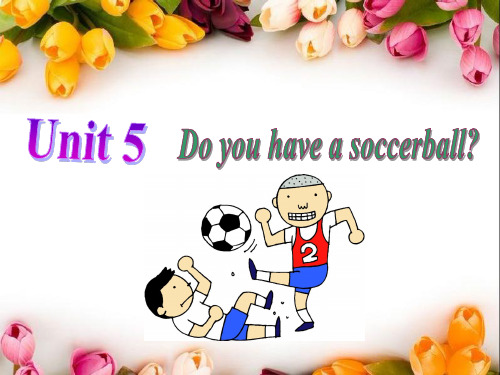
一.用do的适当形式填空。
1. _D_o__e_s_ he watch TV at night?
Yes, he does.
2. _D__o__ you go to school everyday(每天)?
1a Match the words with the pictures.
e
a
d
b
1b Listen and check (√) the description words you
hear in 1a.
√
√
√
1c Listen again. What does Paul say about these
Do you have a soccer ball? 第一课时
Do助动词,第三人称单数形式does。 助动词开头的句子和Be动词开头的句子 一样属于一般疑问句。
I have a soccer ball.
(改为一般疑问句) 分析:原句没有be动词,加一个助动词, 人称要对应。
Do you have a soccer ball ?
Cindy: Helen:
Hey,
OK.
Helen,
l—et—’s
go!
We’r—e —late!
Cindy: —Do—you have the baseball? Helen: Yes, I d—o—. It’s in my bag. Cindy: And where’s our baseball bat?
boring 没趣的;令人厌倦的
- 1、下载文档前请自行甄别文档内容的完整性,平台不提供额外的编辑、内容补充、找答案等附加服务。
- 2、"仅部分预览"的文档,不可在线预览部分如存在完整性等问题,可反馈申请退款(可完整预览的文档不适用该条件!)。
- 3、如文档侵犯您的权益,请联系客服反馈,我们会尽快为您处理(人工客服工作时间:9:00-18:30)。
Period 3 Section B 1a—1dⅠ.教学准备1.教师:制作表格、多媒体课件,搜集一些日常娱乐活动的图片。
2.学生:准备好调查报告。
通过询问老师、同学或上网查询的方式了解各种运动的竞赛方法;调查同学、朋友或家人所喜欢的运动项目及其原因。
Ⅱ.教学目标1.让学生学会运用所学语言项目谈论自己的日常娱乐活动并作出评价。
2.培养学生的参与意识,友好地向别人提出建议,通过合作学习,启发学生思维,培养合作意识,掌握良好的学习方法,形成灵活、综合运用所学语言知识的能力。
3.学习本课的知识点:(1)词汇:interesting,boring,fun,difficult,relaxing,watch,TV(2)句型:—Let's play computer games.—That sounds interesting.4.帮助学生掌握一些听力技巧,如听重点词。
Ⅲ.教学重点(1)词汇:interesting,boring,fun,difficult,relaxing,watch,TV(2)句型:—Let's play computer games.—That sounds interesting.Ⅳ.教学难点1.学会使用描述性形容词。
2.引导学生进行听力和口语交际训练,学会用Let's...提建议,并能够谈论自己喜欢哪些运动、不喜欢哪些运动及其原因。
借助学生喜爱运动的心理,同时通过谈论怎样和自己的朋友度过一段愉快的时光,培养同学之间和睦相处、互相帮助、团结友爱的精神,让学生更加热爱体育活动并培养一种适合自己的体育爱好。
Ⅴ.教学步骤Step 1:Greetings and talking建议1:通过师生问答进行自由交际。
教师问多个学生问题,让学生回答,目的是为了训练学生开口说英语的能力,提高学生学习英语的兴趣。
教师在与学生进行自由交际时要结合本单元已经学过的语言项目,要围绕这个课时的句型“—Let's play computer games.—That sounds interesting.”展开。
建议2:通过学生相互问答进行自由交流。
让学生之间相互提问题,训练学生的口语交际能力。
For example:S1:Do you have a baseball?S2:Yes,I do.S1:Let' play baseball.S2:That sounds good.S1:Does she have a pingpong bat?S2:Yes,she does.S1:Let's play pingpong ball.S2:That sounds good.建议3:通过chant来复习have,has的肯定句、一般疑问句、否定句的用法。
chant 的形式可以营造氛围,调节情趣,激发兴趣,锻炼和加强学生的记忆,帮助他们掌握知识;更能培养学生良好的语音、语调,增强其语感。
I have,you have,they have.She ha s,he has,Mary has.Do I,do you,do they?Does she,does he,does Mary?I don't,you don't,they don't.She doesn't,he doesn't,Mary doesn't.Step 2:Check the homework建议1:检查上节课的家庭作业。
找几位学生站起来,向全体学生朗读自己所编的对话,目的是了解学生对上节课所学语言项目的掌握情况。
A:Do you have a baseball?B:Yes,I do.A:Great!I have a bat.Let's play!A:Does John have a soccer ball?B:No,he doesn't.A:Does he have a pingpong bat?B:Yes,he does.I think he has a pingpong ball,too.A:Hmm...let's ask.建议2:让学生小组内交换家庭作业,检查有无语言错误,然后再朗读、分角色对话,目的是检查家庭作业,并培养学生的动口能力,激发学生学习英语的兴趣。
Step 3:Practice the new words建议1:通过处理课文的1a部分来练习新单词。
教师可以让学生在课本上直接完成,然后把单词写在黑板上,把interesting,relaxing,boring 这三个单词写在一组,便于学生抓住其共同点。
教师领读,让学生齐读,再找个别同学读,确保学生把这些词汇读正确。
interesting difficultrelaxing funboring建议2:教师给学生出示一组形容词和一组图片,让学生猜哪个图片表达的是哪个形容词的含义。
可以把学生分成4~6组,进行抢答,答对得一分,比一比哪组得分最高。
建议:3:学生可与同伴互相画图表现某个形容词的含义,让同伴猜出这个单词,或者一个学生画图,向全班展示,让全体同学猜,以完全理解该词。
这样既可以提高学生的学习兴趣,又可以练习新单词。
建议4:可以让学生自由发挥,使用所学新单词造句。
既可以练习五个形容词的用法,又可以复习前面所学的单词。
For example:She has an i nteresting book.The question is difficult.T he TV show is boring.The computer game is fun.Step 4:Present the new sentences建议1:利用多媒体图片进行操练:教师呈现一张图片,然后让学生根据图片所提供的语言信息进行简单的对话练习,目的是训练本课时所学的语言项目。
教师先向学生出示图片,让学生从整体上了解图片所提供的信息,朗读短语。
教师可以先与班里的同学做个示范,然后让学生根据示范进行问答练习。
For example:T:Let's play volleyball.S1:That sounds interesting.T:Let's play baseball.S2:That sounds difficult.T:Let's play soccer ball.S3:That sounds good.T:Let's play tennis.S4:That sounds fun.T:Let's watch TV.S5:That sounds boring.建议2:创设情景进行操练:假如在假期中你和朋友在一起,你们讨论下午的活动安排。
创设真实情景使学生将所学语言结构应用到实际生活中,培养他们用英语交际的能力。
A:Let's play computer games!B:That sounds interesting,but I don't have a computer.A:Well,do you have a volleyball?B:Yes.A:Then let's play volleyball.B:That sounds fun.Step 5:Listening1.创设情景,利用问题导入听力内容:保罗和他的朋友在讨论课外活动安排,让学生听录音,在1a中勾出所听到的形容词。
2.让学生再听一遍录音,然后把保罗评论下列活动的形容词填在横线上。
play computer games ____________play volleyball ____________watch TV ____________pl ay basketball ____________3.你扮演保罗,你的同伴扮演保罗的朋友珍妮,谈论1c中的活动。
Paul:Let's play computer games.Jenny:That sounds interesting,but I don't have a computer.Paul:Well,do you have a volleyball?Jenny:Yes.Paul:Then let's play volleyball.Jenny:Oh,volleyball is so difficult...Paul:OK,let's watch TV.Jenny:That sounds boring.Hmmm...Let's play soccer!Do you have a soccer ball?Paul:No,I don't.Jenny:Oh.Well,d o you have a basketball?Paul:Yes,I do.Let's play basketball!Jenny:That sounds fun!Step 6:Task假设周五下午要进行活动。
教师让学生以小组为单位决定自己的活动方式。
运用所学句型征求其他成员的意见。
ActivitiesStep 7:Summary1.本课时学习了 interesting,difficult,relaxing,fun,boring等形容词及一些动词短语,重点学习和操练了新语言项目“—Let's play computer games.—That sounds interesting.”。
2.掌握了一些听力技巧。
Step 8:Homewor k根据下面所提供的信息编一个英语对话。
baseball板书设计bori ng备课资料知识讲解1.interesting 形容词,意为“有趣的”。
可以作表语,其主语通常是事或物,指某事或某物本身有趣;也可以作定语,既可以修饰人,也可以修饰物。
The book is very interesting.这本书很有趣。
That sounds interesting.那样听起来很有趣。
I have an interesting book.我有一本有趣的书。
He is an interesting man.他是一个有意思的人。
interested 形容词,意为“感兴趣的”。
多用于“be/become interested in...”这一结构中。
interested 作表语,指某人对某事物感兴趣,其主语是人,而不是物。
Are you interested in soccer ball?你对足球感兴趣吗?He is interested in the computer.他对电脑感兴趣。
interest 名词,意为“兴趣,爱好”。
